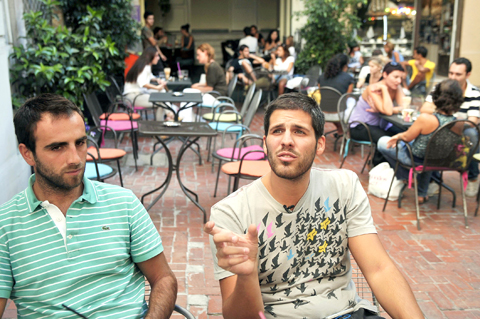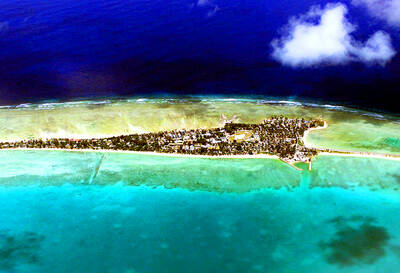In a cafe in central Athens, two young men drink coffee and discuss plans for their future, going over preparations that will uproot them from the Greek capital to London.
Kostas Karanikos and Komninos Arvanitakis — both 26, both with graduate degrees, unemployed and struggling to find work — have decided to try their luck in Britain.
They are among seven out of 10 young Greeks that a survey has shown want to leave Greece for a better life abroad.

PHOTO: AFP
Komninos has been without a job since finishing his nine months’ military service last summer.
“It’s a nightmare,” he says.
“I love my country, all my friends and family are here, but after one year, what can I expect? I expect nothing. There’s little to look forward to here in Greece,” he says.
“We don’t have a lot of choices, that’s the sad truth,” Kostas says.
According to the survey by Kapa research for the To Vima newspaper, 73.6 percent of educated young Greeks say they would move abroad if they had the chance.
Of those, 42 percent — as many as a quarter-of-a-million young Greeks — are already making plans to leave, said the poll of 5,442 people aged 22 to 35 and with at least two years’ higher education.
Latest figures show Greek unemployment at 11.8 percent and reveal the young are hardest hit, with almost one in four 15 to 29 year olds — or 22.8 percent — out of work during the second quarter of this year.
As Greece’s recession deepens, and with government plans for further cutbacks, 86 percent surveyed believe the worst is yet to come.
“Morale in Greece is very low,” says Komninos, who has applied for more than 100 jobs in the past year with limited success.
He has a masters degree in political sciences, and Kostas in design, but the only jobs they can find are low skilled and poorly paid, often with no proper contract or overtime pay.
“There is a brain drain in Greece,” says Lois Labrianidis, an economic geographer from Thessaloniki University. “It has been going on for quite a long time.”
His estimate is that between 110,000 and 135,000 graduates are working abroad, 9 percent of the total of Greek graduates.
“Having more qualifications doesn’t mean you’re going to have less chances of being unemployed and it definitely doesn’t mean you are going to get remunerated better than the people with less qualifications,” he says.
There is little demand for graduates in the Greek economy, Labrianidis says.
This trend has increased in recent years, notably since the early 1990s with service companies competing to lower their costs, and might intensify even more with the crisis, he says.
“Too many graduates, not enough jobs,” sums up Savas Robolis, scientific director of the research arm of the GSEE, Greece’s main private sector union.
Of 80,000 new graduates seeking to enter the job market each year, he says Greek companies have vacancies to absorb just half.
Back in the 1960s, the majority who left Greece were blue collar or agricultural workers. “Now it’s different, of course the consequences are negative and much more serious,” he adds.
As Greece tackles a debt burden of close to 300 billion euros (US$390 billion), the trend for bright but disillusioned young Greeks to move abroad is likely to undermine long-term economic growth, warns a recent OECD report.
The study urges governments to invest in higher education, arguing that a better-educated workforce can boost jobs and increase tax revenues.
Robolis predicts the Greek government will need to call on Greek nationals who have left Greece to return home.
“We’ll have to offer them better conditions, it depends on the incentives,” he says.
Komninos is resigned.
“We don’t want to go out and live our lives outside of Greece, but if things go on the way they are now, we’re not going to come back,” he says.

DISASTER: The Bangladesh Meteorological Department recorded a magnitude 5.7 and tremors reached as far as Kolkata, India, more than 300km away from the epicenter A powerful earthquake struck Bangladesh yesterday outside the crowded capital, Dhaka, killing at least five people and injuring about a hundred, the government said. The magnitude 5.5 quake struck at 10:38am near Narsingdi, Bangladesh, about 33km from Dhaka, the US Geological Survey (USGS) said. The earthquake sparked fear and chaos with many in the Muslim-majority nation of 170 million people at home on their day off. AFP reporters in Dhaka said they saw people weeping in the streets while others appeared shocked. Bangladesh Interim Leader Muhammad Yunus expressed his “deep shock and sorrow over the news of casualties in various districts.” At least five people,

It is one of the world’s most famous unsolved codes whose answer could sell for a fortune — but two US friends say they have already found the secret hidden by Kryptos. The S-shaped copper sculpture has baffled cryptography enthusiasts since its 1990 installation on the grounds of the CIA headquarters in Virginia, with three of its four messages deciphered so far. Yet K4, the final passage, has kept codebreakers scratching their heads. Sculptor Jim Sanborn, 80, has been so overwhelmed by guesses that he started charging US$50 for each response. Sanborn in August announced he would auction the 97-character solution to K4

SHOW OF FORCE: The US has held nine multilateral drills near Guam in the past four months, which Australia said was important to deter coercion in the region Five Chinese research vessels, including ships used for space and missile tracking and underwater mapping, were active in the northwest Pacific last month, as the US stepped up military exercises, data compiled by a Guam-based group shows. Rapid militarization in the northern Pacific gets insufficient attention, the Pacific Center for Island Security said, adding that it makes island populations a potential target in any great-power conflict. “If you look at the number of US and bilateral and multilateral exercises, there is a lot of activity,” Leland Bettis, the director of the group that seeks to flag regional security risks, said in an

ON THE LAM: The Brazilian Supreme Court said that the former president tried to burn his ankle monitor off as part of an attempt to orchestrate his escape from Brazil Former Brazilian president Jair Bolsonaro — under house arrest while he appeals a conviction for a foiled coup attempt — was taken into custody on Saturday after the Brazilian Supreme Court deemed him a high flight risk. The court said the far-right firebrand — who was sentenced to 27 years in prison over a scheme to stop Brazilian President Luiz Inacio Lula da Silva from taking office after the 2022 elections — had attempted to disable his ankle monitor to flee. Supreme Court judge Alexandre de Moraes said Bolsonaro’s detention was a preventive measure as final appeals play out. In a video made